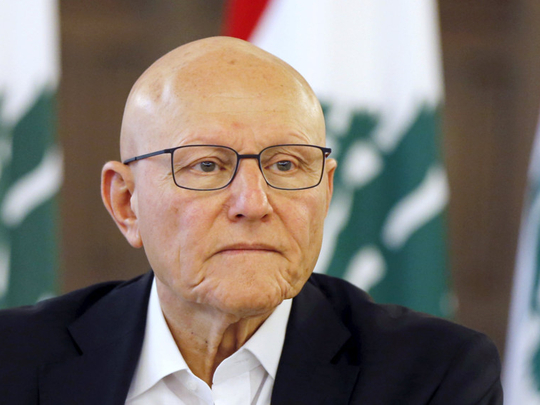
Tammam Salam does not own Lebanon, of course, but the Prime Minister is now the “Custodian of the Cedar”, a modest symbol that stands for liberty in a part of the world where little of it flourishes. Regrettably, his premiership has been troubled, not because he lacks vision but because competing agendas embedded in one of the most dysfunctional cabinets ever assembled, stifled progress. This has effectively meant that the man who could protect existing institutions and gradually introduce genuine reforms was prevented from doing either.
Salam now confronts his greatest challenge: Concede that the Ta’if Accords have failed and that a new “Constitutional Convention” is a must to save Lebanon. Will this occur?
Abused and disrespected beyond description on so many levels by several members of his own cabinet, Salam confronted “political garbage” and must, sadly, deal with the country’s physical trash too. When protesters finally took to the streets, inevitable clashes further complicated matters, the result of both shortsightedness and incompetence. The premier admitted that “excessive force” was used against demonstrators last weekend in Beirut, although Internal Security Forces had no choice but to respond to hooligans that hijacked the “You Stink” civil society movement marches.
Yet, and beyond the waste issue, which was real and highlighted the environment minister’s ineptitude, the latest crisis illustrated that Hezbollah and the Free Patriotic Movement — the two parties that were identified by the interior minister as the putative instigators of the hooliganism on display — planned to force a resignation of the prime minister. The purpose was clear: Create a total political vacuum that will impose a new constitutional convention to renegotiate the 1989 Ta’if Accords. In other words, what Hezbollah — and it is important not to hide behind the curtain but call a spade a spade since it is the extremist party that wants to bring this government down — intends to accomplish is to impose a Thulathiyyah [Trisection] — a new tripartite power-sharing formula between Christians, Sunnis and Shiites.
This proposition is impossible to achieve under current circumstances and while the principle of “mutual coexistence” (Al ‘aysh Al mushtarak) is still valid, what is now occurring may well be the last nail in its coffin. Ironically, and although those who demonstrated this past weekend clamoured for much more than mere coexistence, the demands for proper representation and accountability did not hinge on radical transformations. To be sure, most Lebanese desired to gradually eliminate confessionalism from the body politic and establish the foundations of genuine citizenship, even if everyone realised that such an outcome was decades away. Still, initial steps were necessary, which pivoted on trust and responsibility, two alien concepts in this society that, without denying it, managed to accomplish miracles on an individual basis but failed in the all too critical nation-building category.
Naturally, wily politicians quickly understood what was under way, led by the Druze chieftain, Walid Junblatt, who hit the nail on the head when he opined that some political forces were trying to take advantage of the civil society demonstrations, cautioning that there were attempts to “expand the paralysis and obstruction and undermine the pillars of the system and [its] stability”. Junblatt backed Salam and urged him not to resign. The Lebanese Forces leader, Samir Geagea, who also warned of dire consequences if the premier tendered his resignation, preceded him in this call. Paradoxically, and notwithstanding his profound dislike of Geagea, Junblatt must know deep in his heart that the head of the LF is the only leader capable of sinking the March 8 programme to redraw the political map of Lebanon, in which the Druze and all other minorities will wither away at the proverbial vine. Geagea’s recent overtures to Michel Aoun ought to send a clear signal to the Druze, given that under a Thulathiyyah formula, there may be no room for them, unless they accept to be an appendage to either Sunni or Shiite communities.
Given that Hezbollah’s gamble will create a Shiite governing majority, with a junior Christian partner (FPM) placed into a permanent minority status, it was fair to ask what that might explicitly mean? Was it the destruction of the mutual coexistence formula? Will it corner Sunnis into the status of a permanent minority? Will that upset the confessional balance in the country and place Lebanon in a long-term peril vis-a-vis Syria?
If Beirut’s confessional mechanism is hastily removed without an effective alternative, at least two serious outcomes will arise. First, Christians who would then be institutionalised as a permanent political minority will most likely leave Lebanon in hordes, and without its Christians, Lebanon will gradually lose its Arab identity. Far more important, such a loss will also signal the demise of the country’s tested, even if partial, secularism. The second outcome would see Lebanon’s dejected Sunnis emerge as a potential source of threat to the new majority, with renewed clashes and, perhaps, war between Sunnis and Shiites.
For co-existence to flourish and security to anchor, it is essential that a new elite emerge in Lebanon, one that includes men of the stature of its founders — including Bisharah Al Khouri, Riad Al Solh, Camille Chamoun, Majid Arslan, Saeb Salam, Michel Chiha and Charles Malek, among others.
Tammam Salam came close as he incarnated the founders’ vision to preserve existing institutions. Naturally, custodianship was not easy and while he may forego his premiership out of sheer frustration, that will be a Gargantuan error. Lebanese citizens were ready to share their lifesavers with Salam who, unfortunately, seemed destined to swim with hungry and starved sharks. The vast majority hoped that he would keep a steady balance between his two hands: Uphold the constitution in one and defend order in the other.
Ninety-five years after the creation of its current borders and 70 years after independence, Lebanon has failed to amalgamate the many nations that inhabit it and while it harbours democratising tendencies — it is the only functioning democracy in the entire region on account of its extreme levels of tolerance — the consociational democracy was under duress. While it may be possible to argue that the system outlived its usefulness and may be in need of a complete overhaul, an interim adjustment period was necessary to prevent a partition of the country, alleviate the fears that different sects have of each other, and attend to the basic needs of society instead of wallowing in corruption. Salam was capable of seeing the country through the current storm though his most important challenge was to hold on to it. Surrendering and handing it over to those who intend to destroy its pillars is bound to be fatal.
Dr Joseph A. Kechichian is the author of Iffat Al Thunayan: An Arabian Queen, London: Sussex Academic Press, 2015.











